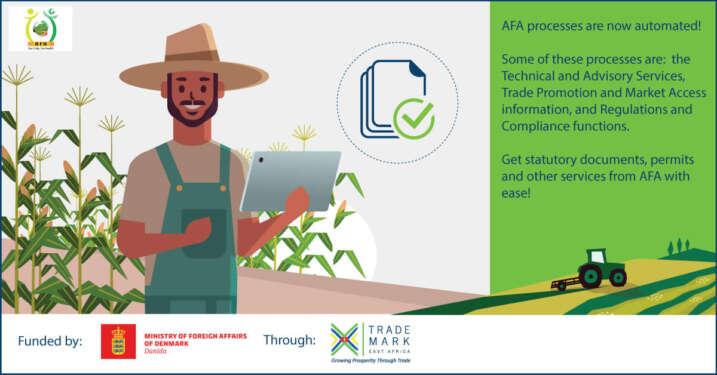The new automated issuance of import and export services which has gone live this month is aimed at providing efficiency and compliance among importers and exporters.
AFA-IMIS which stands for Agriculture and Food Authority of Kenya Integrated Management Information System was collectively launched by Kenya’s Ministry of Agriculture, Livestock, Fisheries and Cooperatives, TradeMark East Africa (TMEA), and AFA to automate agricultural business processes including the issuance of permits and licensing.
This is an 8-in-1 Single Window Information for Trade (SWIFT) system covering the certification and licensing of trade in cash crops including tea, coffee, nuts, oils, sugar, horticulture, flowers, cotton, sisal, pyrethrum, food crops, and other industrial crops. It will provide an efficient platform for the delivery of technical and advisory services, market research, product development, regulations, and compliance functions for the export and import of cash crops. The platform was developed through a project funded with a contribution of US$1.37 million.
According to Kello Harsama, Director General of AFA this system will help serve the agriculture sector well. “As AFA we are not only concerned with food that is coming into Kenya, but also food that is being produced in Kenya. Soon we will start surveillance on food grown in Kenya like tomatoes, to enforce regulations on pesticide use and ensure food supplied to markets from our farms is fit for human consumption,” said Harsama.
Also read: East African businesses adopt digital solutions amid covid-19
On his part, Denmark’s Counsellor Morgen reiterated Denmark’s commitment to supporting Kenya’s green trade efforts and the continued fight against COVID-19. He remarked “COVID-19 has challenged the capacity of the society to work remotely. Kenya is well-positioned to do so, and this new system is money well spent.
TMEA’s Senior Director, Trade Environment, Alban Odhiambo noted that in the last year, TMEA supported the development of over 15 online systems in government agencies as part of its contribution to the digitization agenda. This, he remarked, will reduce not only the costs and time taken to trade, but support efforts for green trade as paper use within government agencies is reduced. At the same time, TMEA Country Director Mr. Farah in remarks given before the launch event said that programming in Kenya will continue supporting the government agenda in creating jobs, and enhancing economic development. He noted that digitization is a key catalyst for industrialization as it provides critical and efficient market linkages as well as enhancing business operations by bringing down costs of production. The automation will reduce the time and costs related to regulation and compliance of import and export of agricultural plant products, by almost half.
Also read: Uganda increases import duty on agricultural products
The AFA predicts to significantly reduce incidences of loss and duplication of records and reduce lack of accountability of crop production by stakeholders. The data collected via the system will inform better decision-making in the regulation and administration of agricultural commodities.
The portal will provide important information related to production, processing, and trading in agricultural commodities regulated by AFA directorates. This will eliminate a key barrier to trade – access and availability of information.
AFA–IMIS has an integrated payment platform that provides a guarantee of services through end-to-end processing of applications. 4500 permits/licenses and certificates have been issued through the system since its operationalization started in January 2020. The system has been integrated into the Kenya Electronic Single Window.
According to the Kenya Revenue Authority website on import and export duties, taxes are payable depending on the value of the item(s) and the duty rate applicable outlined under different legal documents. For import duties depending on the item to be imported, the Import tax rates vary between 0%, 10%, and 25% as provided by the East Africa Community Common External Tariff (CET). However, Sensitive items Attract duties higher than 25%. The sensitive items are listed in schedule 2 of the EAC Common External Tariff.
